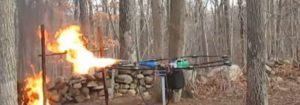 Connecticut’s Public Safety and Security Committee decided to take no action on proposed bill HB- 7260, which would have allowed law enforcement to use weaponized drones.
Connecticut’s Public Safety and Security Committee decided to take no action on proposed bill HB- 7260, which would have allowed law enforcement to use weaponized drones.
The bill was originally designed as a response to a Connecticut teen’s YouTube videos showing drones that he equipped with a flamethrower and a handgun. (The teen and his father are currently in court with the FAA over the incident.) The bill criminalized weaponized drones, established two misdemeanor degrees of “reckless endangerment with a drone” and extended voyeurism laws to drone use.
The proposed exception from the weaponization ban for law enforcement led the public and the media to characterize the bill entirely as one allowing police to use weaponized drones. Had the bill passed, CT would have become the first state in the US to allow the police to utilize weaponized drones, although North Dakota does allow non-lethal weaponized drones.
The bill also prompted criticism from drone advocates. The industry has struggled to help inform local drone laws, which can create significant barriers for commercial operators.
The American Civil Liberties Union of Connecticut applauded the defeat of the bill, on the basis that the bill did not define limitations about the use of camera drones to capture evidence that might be used in court.
“Today, the legislature sent a loud and clear message that Connecticut does not need and will not accept police equipping drones with weapons,” said David McGuire, executive director of the ACLU of Connecticut. “The defeat of this police drone weaponization proposal is a victory for public safety and civil rights.”
“Connecticut does not need police wielding flying weapons in our towns and communities.”

Miriam McNabb is the Editor-in-Chief of DRONELIFE and CEO of JobForDrones, a professional drone services marketplace, and a fascinated observer of the emerging drone industry and the regulatory environment for drones. Miriam has penned over 3,000 articles focused on the commercial drone space and is an international speaker and recognized figure in the industry. Miriam has a degree from the University of Chicago and over 20 years of experience in high tech sales and marketing for new technologies.
For drone industry consulting or writing, Email Miriam.
TWITTER:@spaldingbarker
Subscribe to DroneLife here.







[…] drones with weapons were an exception in the broader context of the bill, which hoped to make all weaponized drones illegal. A study on the feasibility of weaponized drones for law enforcement, including the potential […]